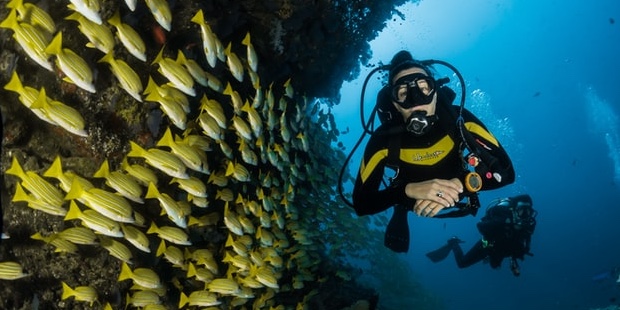SCUBA diving allows for the exploration of new environments, but with these environmental changes comes a danger. With over 2 million recreational divers and 3,000 commercial divers in the United states, it is important to understand these dangers and improve diver safety. As depth and pressure increase, the force exerted on the body increases at a rate of 1 atmosphere per 33 feet. The body itself is fairly good at withstanding this pressure. The danger comes from its effect on gasses inside the body. Compressed air takes up less volume for the same amount of matter, meaning that it takes more air to fill the lungs at depth, causing divers to go through air faster than they would at the surface.
Continue reading “Under Pressure – How Underwater Environments Affect SCUBA Divers”Author: Hunter Yates
arthritis balance bio-inspired design bone brain climbing extreme conditions feet flight flying animals growth and development hands heart and the cardiovascular system humans impact joints jumping land animals lungs and the respiratory system marine animals martial arts material science medicine muscle other injury other sports pain plants predation prevention prosthetics recovery and rehabilitation robots running skin spine and back sports injury strength training surgery swimming technology tendons and ligaments tissue engineering treatment walking
Recent Posts
- Watch Your Step: The Relationship between Flat Feet and Arthritis
- Sunscreen’s Secrets: How Is It Really Helping?
- Vibration and Perception: Your Bike’s Buzz Might Trick Your Brain to Push Harder
- Goldilocks of Weight Training: The Balance between High-Volume and Low-Volume
- Tap out before your ligaments do: The mechanics of Jiu Jitsu joint submissions
Topics
arthritis (8)
balance (12)
bio-inspired design (11)
bone (21)
brain (16)
climbing (8)
extreme conditions (10)
feet (11)
flight (7)
flying animals (9)
growth and development (10)
hands (8)
heart and the cardiovascular system (13)
humans (31)
impact (20)
joints (51)
jumping (12)
land animals (24)
lungs and the respiratory system (8)
marine animals (15)
martial arts (7)
material science (8)
medicine (13)
muscle (27)
other injury (12)
other sports (29)
pain (9)
plants (10)
predation (11)
prevention (25)
prosthetics (12)
recovery and rehabilitation (17)
robots (13)
running (24)
skin (9)
spine and back (12)
sports injury (38)
strength training (13)
surgery (20)
swimming (9)
technology (11)
tendons and ligaments (31)
tissue engineering (7)
treatment (15)
walking (11)
Archives
- November 2025
- October 2025
- August 2025
- December 2024
- November 2024
- January 2024
- December 2023
- November 2023
- October 2023
- January 2023
- October 2022
- September 2022
- May 2022
- April 2022
- July 2021
- June 2021
- May 2021
- April 2021
- December 2019
- November 2019
- October 2019
- September 2019
- August 2019
- April 2019
- March 2019
- January 2019
